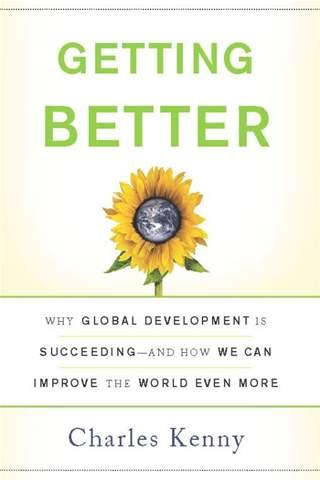“The world is a better place to live now than it ever was before.” That chipper pronouncement is certainly a welcome message, especially when delivered in a jolly British accent. Author Charles Kenny raises hopes even further with this: “The future will be even better.”
An economist and senior fellow at the Center for Global Development, Kenny is clearly a glass-half-full kind of guy. He visited the Clinton School of Public Service in Little Rock this month to talk about his book, Getting Better: Why Global Development is Succeeding—and How We Can Improve the World Even More. The author acknowleges that there is still far too much suffering in the world, but says he sees important progress everywhere he looks. Even in countries where the economy is shrinking, health care and infant morality rates are improving, he said.
It’s hard to deal with heavy topics like poverty, disease and violence with a soft touch, but as I mentioned, the cheerful British accent certainly helped. Below are some of his most encouraging observations.

Kenny on destiny:
Kenny dismisses economists who say that some countries and continents, shackled by geography and history, are destined to suffer poverty and ill health. To prove his point, he offers up a night-time map of the Korean Peninsula showing the northern half in darkness while South Korea is well lit. “Fifty years ago, they were the same country,” he said.
On child mortality:
“Historically, being a child was an immensely dangerous experience,” he said. But over the last century infant mortality worldwide has dropped drastically and now stands at 4 percent. “I can’t really think of a better measure of progress than fewer children dying.”
On formerly poor countries prospering:
Wealthy countries shouldn’t fear progress in developing nations, Kenny said, because we all benefit from helping poor countries get richer. “When they get richer, they buy more stuff from us,” he said.
On climate change:
The technology and know-how already exist to decrease our reliance on fossil fuels, Kenny said. But saving the planet will also take great political will. “If this is the biggest threat we’ve got, it’s pretty good,” he said. “As long as we don’t muck up on climate change, the future is going to be even better.”
You can learn more about Kenny's ideas and research at the Center for Global Development and on his personal blog.
Pictured above, Bal Bhadhur Kathait holds his 18-month-old grandson, Hemanta Bhadhur Kathait, as the two explore a coriander garden in the Banke District of Nepal. Photo by Russell Powell
